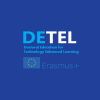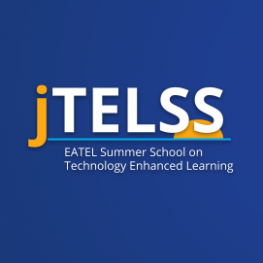Speakers
Maria Victoria Soule
Cyprus University of Technology, CyprusAnna Nicolaou
Cyprus University of Technology, CyprusAntigoni Parmaxi
Cyprus University of TechnologyLaia Albó
Universitat Pompeu fabra, SpainStart
26/05/2022 - 10:30
End
26/05/2022 - 12:00
Qualitative Research in Technology Enhanced Learning
Friday 27/05 10:30-12:00h
Outdoor Area B
This session is organized by the DETEL Erasmus+ project. 
DETEL is a strategic partnership among nine European universities and EATEL to reflect their expertise in doctoral education into a new study program in TEL, extended with rich and professionally produced OERs.
Abstract
This Qualitative Research workshop will mainly introduce participants to Qualitative Research and Computer Assisted Qualitative Data Analysis (CAQDAS) through the use of NVivo, a software program used for qualitative and mixed-methods research. It will be divided into two main parts, starting with a general theoretical introduction on Qualitative Research and moving on to the more practical part, in which participants will be provided with the opportunity to attend a demonstration of entering and coding qualitative data. Initially, prior to the workshop, participants will be provided with some pre-reading and pre-viewing material, through which they will be informed about the specific software, NVivo, and they will be given instructions as to how to install it on their device, so as to prepare for the synchronous workshop. During the synchronous workshop, the trainer(s) will firstly provide a brief introduction to Qualitative Research theory, key considerations of Qualitative Data Analysis (QDA) and then describe how CAQDAS can support QDA. The basic features of NVivo will then be demonstrated, focusing on how it can be used for entering and coding data mainly yielded from interviews, pdf, surveys, websites, among others.
Needs Analysis
A recent survey conducted within the DETEL project (https://ea-tel.eu/de-tel/survey) showed that despite the fact that qualitative research is one of the research methods most used by PhD students in TEL, students still demand training in this method. This workshop aims to address students’ needs by providing the participants with up-to-date references on qualitative research as well as on how to use Computer Assisted Qualitative Data Analysis (CAQDAS) in their research.
Learning Objectives
The main learning objectives are:
- To introduce participants to Qualitative Research
- To name key considerations of Qualitative Data Analysis (QDA)
- To describe how Computer Assisted Qualitative Data Analysis can support QDA
- To understand basic features of NVivo
- To learn how to enter and code raw data, organise your coding, or your cases, write memos and explore data in NVivo
Pre-activities
Participants will be provided with a core reading list of scientific and media articles as well as a number of online videos. Completion of this task will be required to participate successfully in the workshop.
Session Description
Participants will receive information about Qualitative Research, Computer Assisted Qualitative Data Analysis (CAQDAS), and Qualitative Coding. The session will include a NVivo demo part and an interactive-hands-on session part. The workshop will be followed directly by a feedback session where students will be able to discuss their own research in the frame of qualitative studies.
Post-activities
A more advanced reading list will be provided to participants in order to deepen their knowledge.




